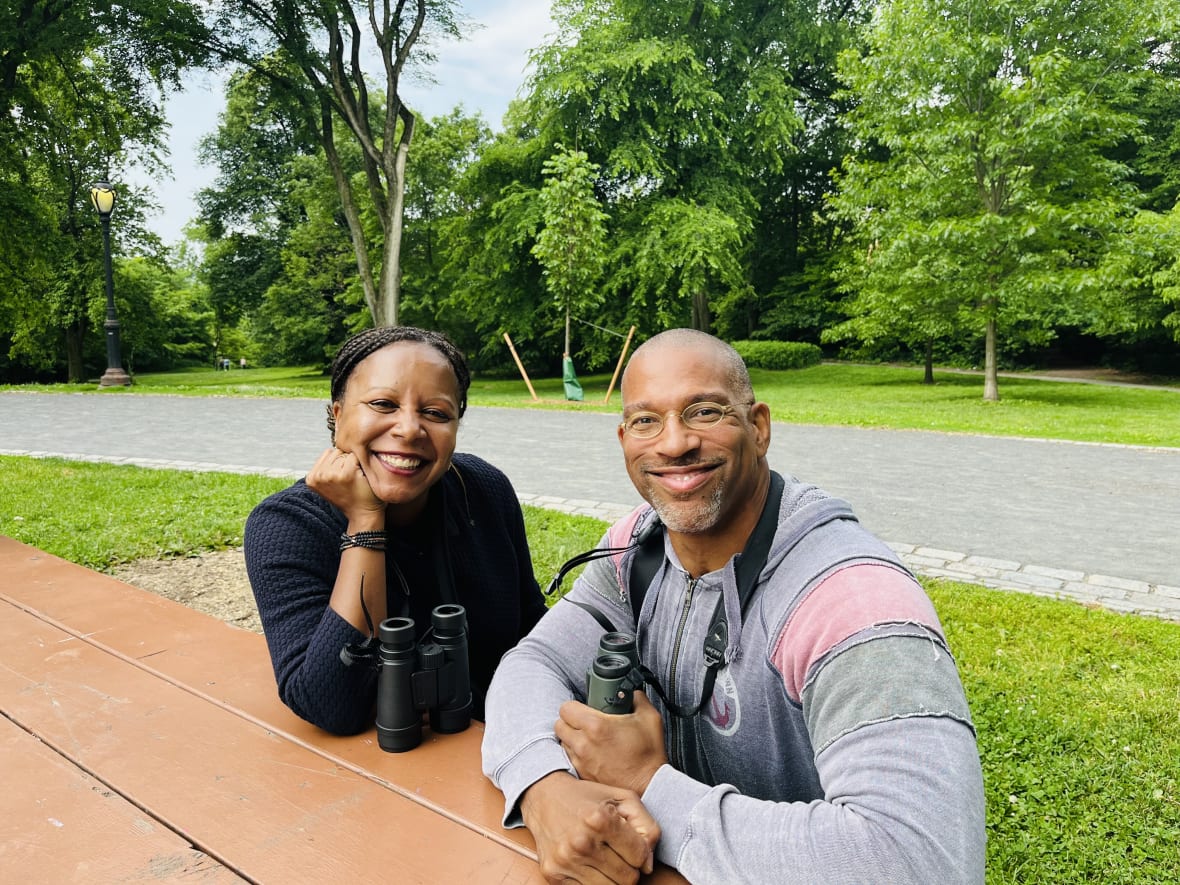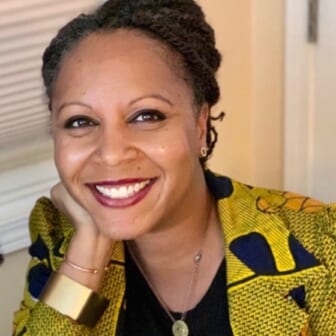Christian Cooper talks about his new birding show, avian threats and ‘dirty sky rats’
The host of the new series “Extraordinary Birder” shares how to embrace birdwatching and help conserve bird populations and their habitats.

I recently went birding with famed birder and educator Christian Cooper. We walked through Central Park in New York City to discuss his new show, “Extraordinary Birder with Christian Cooper” (premiering June 17 on Nat Geo Wild and June 21 on Disney+), as well as his new book, “Better Living Through Birding.”
Cooper also joined me on theGrio’s Black Podcast Network as a guest on “The Blackest Questions.” During the episode, which will air June 27, we talked about Karens and racist bird names. But during our time outdoors, we focused on habitats for birds and threats to their population.
This Harvard University alum has a background in science, once worked for Marvel Comics, and has a long history of LGBTQ+ activism and criminal justice reform. With binoculars strapped around our necks, we meandered through the park, strolling past other early morning birders, dog walkers, bikers, and joggers while he pointed out chimney swifts, aka flying cigars, as they ate bugs in midair just above us.
Most people were first introduced to Cooper in 2020 when he was accosted by a white woman while birding in the Ramble in Central Park. (This is the same park where the now Exonerated Five were accused of rape just a few decades ago.) As the woman threatened to call the police and asserted she would tell the police that “an African American man is threatening my life” simply because he asked her to leash her dog, she sparked a national and international conversation about race, gender, nature, diversity within the birding community, safe spaces, Karens, and the politics of respectability. Cooper chose not to press charges against his accuser, instead focusing on educating the larger public about birding, highlighting the various groups and organizations working on conservation, increasing the Black birding community, and introducing young people to the joys of nature.
As a “pandemic birder,” someone who is relatively new to birding and discovered it during the 2020 lockdown, I had so many questions for Cooper. I am now a devout bird nerd and am trying to learn as much as I can about birds, their environments, and what we can do to conserve the bird populations and their habitats. I also wanted to get Cooper’s thoughts on a particular bird we often see in our daily lives just passing us by. For those of us who dwell in urban environments, I had to get his opinion on pigeons. I am not a fan and see them as dirty sky rats. However, after hearing Cooper explain the immense diversity within the pigeon population, their intellect, and the reasons why they are perceived as dirty birds (answer: it’s because of the human population), I now have a new respect for these flocks.
Cooper argues that pigeons are “good ambassadors” in that they are often the first bird so many city folks know. If you look closely, they come in a multitude of different colors and are actually descendants of caged birds that got loose. As an educator, he wants to meet people where they are and get them comfortable and interested in the outdoors. As Black people, he argues, we should have the right to go anywhere we choose. Cooper is firm in his belief that we belong in nature if we choose to do so and we should feel safe doing so. He states that “public spaces are as much ours as they are anyone else’s.” Sadly, we are well aware of the history of this country and the many vestiges of racism that still persist. However, in Cooper’s new book “Better Living Through Birding,” he details a myriad of ways Black people (and all people) can be in their natural environments in safe and fulfilling ways.
I couldn’t resist asking Cooper about another bird I see every day on my way to work or running errands: the European starling, a small black bird with iridescent colors and a yellow beak. Cooper explained that this species was brought to New York for a Shakespearean play that has one line about the starling and the producers wanted the actual bird. Well fast-forward several decades and this invasive European species can be found everywhere. Its presence was so pervasive it almost drove the Eastern bluebird, the New York State bird, into extinction by taking over its habitat. The migration and multiplying numbers of this bird made me think of the invasions of European peoples on American soil and the irrevocable changes that have occurred because of their presence.
I asked Cooper about his “Holy Grail” bird. Every birder has a bird that is on their ultimate wish list to see. My Holy Grail bird is the shoebill stork, found primarily in central tropical Africa, from southern Sudan and South Sudan through parts of eastern Congo, Rwanda, Uganda, western Tanzania and northern Zambia, according to Animalia.bio. Sadly, when I was in that region I was not yet a birder and did not go out of my way to find the massive bird, which stands at almost 5 feet and can have a wingspan of over 7 feet. It is a prehistoric-looking bird that makes my heart skip a beat. Cooper’s Holy Grail bird is the resplendent kestrel, which he finally saw in Costa Rica after taking three trips there.
One’s Holy Grail bird is not to be confused with one’s favorite bird. My favorite bird is the bluejay because it reminds me of my late grandfather for some reason. This aggressive bird Cooper calls the “alarm system in nature,” alerting other birds of larger predators in the area. His favorite bird is the Blackburnian warbler. To hear Cooper talk about warblers is pure joy. He calls warblers the “glory of spring migration in the East,” which is why he is in the park at 5:30 each morning during migration to see sometimes 30 types of warblers with different colors and diverse songs making their way north or south.
I asked Cooper what we could do to curtail the rapid bird loss occurring around us. The educator and conservationist reminded me that we’ve already lost roughly 1/3 of all of our birds in North America. We must let politicians know we care. We can also choose green energy supply companies that care about conservation and the natural environment. By choosing electric companies that care about climate change, decreasing fossil fuels, and using solar and wind energy, we can do our part to help save bird diversity. Cooper also reminded me that even if we live in urban environments we can plant native plants in our yard or fire escape to attract pollinators.
For those who are birding curious, it really is easy to start. First, you can tune in to Cooper’s new show, “Extraordinary Birder,” where he gives tips and explains the bird diversity around us as he travels throughout the United States. We can also go outside and start looking and listening. Hopefully, you can get a pair of binoculars. Cooper is a firm believer that hand-me-downs work quite well. We can load birding apps on our phones (like the Merlin Bird ID app) and talk to people we see looking up admiring birds and nests.
Christian Cooper was introduced to many under circumstances that many Black people know far too well. However, joy always comes in the morning…and that is where you will find Cooper, scoping out Baltimore oriole nests, red-winged blackbirds, barn swallows, or my favorite morning bird, the Carolina wren.
Be sure to tune in and enjoy the beauty of birding with Cooper’s “Extraordinary Birder” and check out his new book “Better Living Through Birding: Notes From a Black Man in the Natural World.”

Christina Greer, Ph.D., is an Associate professor at Fordham University, the author of “Black Ethnics: Race, Immigration, and the Pursuit of the American Dream”, and the host of The Blackest Questions podcast at TheGrio.
TheGrio is FREE on your TV via Apple TV, Amazon Fire, Roku, and Android TV. Please download theGrio mobile apps today!



